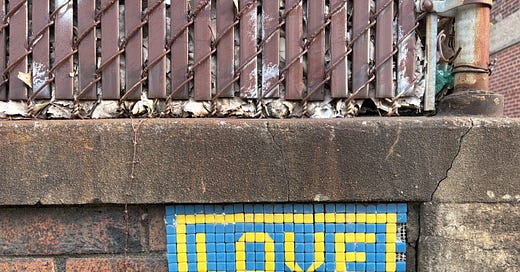Dear friends and Curious Readers,
I’m nestled into one corner of the couch in my daughter’s high-3rd floor apartment, looking through the leaves of the tree tops outside the window, to the rooftops and balconies of the surrounding neighborhood. Another storm is rolling in and as I sit here, it dawns on me that I’ve completely lost track of whatever it is that I thought I needed to do today. It is niggling now, just beyond memory’s reach.
This morning, yesterday by the time you read this, my membership group gathered online for our Maker’s Circle, a time when we simply show up with our own projects in hand and allow the conversation to flow, along with our creativity. These conversations tend to be robust, deep, thought provoking and enriching and today’s was no exception.
Our discussion rolled through all that is happening in the world and our own lives, touching on the deeper places, connection-to-spirit matters and the things we cannot see, each from our own perspective. At one point, I found myself sharing how much some of the messaging around manifesting something into reality chafes me. It puts the onus on the individual to change their circumstances, regardless of the systemic structures upholding them.
It’s an unspoken implication that the person who isn’t receiving the hoped-for outcome is somehow thwarting the favorable outcome. They aren’t praying hard enough, or are praying to the wrong god, or they aren’t proclaiming the right words externally to reflect the correct inner conviction, or they haven’t released something internally and so are blocking their own higher good. Each time I hear some form of these platitudes, I can’t help thinking “but what about the children in Gaza and Ukraine? Can they manifest their way out of their circumstances?”
Often times, the person delivering the message isn’t even aware of their own privilege. That is to say, the circumstances that parted the waters to their miracle weren’t evenly applied across the board of humanity. The college education they received before student loans became predatory, or the stability awarded them from being able-bodied and healthy, being born into a particular people group, living on a partner’s pension or their own retirement fund, or how much having just one mature adult interested in showing them how life works during their formative years enabled them to make decisions that may have looked like parted waters.
Saying all this, I realize, may make me sound just a tad bit cynical. But it’s not a lack of faith—it’s a refusal to spiritualize injustice.
I earnestly believe that our thoughts and words have power. That there is a place where that power is met by the power of the divine, yes, that too. It isn’t that I don’t believe in miracles, god knows I’ve been witness to more than a few. The kind of miracles that came about after I prayed, and the kind that were simply inexplicable, with no way to dismiss the divine nature of the thing.
I used to annoy my kids by quipping “it is, if you think it is” whenever they complained something was too hard to try. Repeating the platitude “whether you think you can or think you can’t, you’re right” to a chorus of teenaged moans. Seriously, my 59-year old self is annoyed just writing the dismissive words of my younger mom self.
Yet, the words we speak to ourselves do matter. Telling my grandkids I believe they can do something they’ve never tried before is often the only permission they need to accomplish something new. Climb a tree, carry a glass of water without spilling, walk on a balance beam? They light up when they realize their own capabilities.
In the children’s book The Little Engine that Could, a small steam engine agrees to pull a heavy load over the mountain when several larger and stronger engines had refused the dangerous trek. The little engine manages to succeed by repeating to itself “I think I can, I think I can” over and over as it draws nearer to the top. But one thing that the little engine never had to consider was how to make that journey if there were no tracks. That’s the reality for so many—especially those navigating trauma, poverty, or displacement. Belief alone can’t bridge every gap.
Research shows that repeated statements can start to feel true over time—a phenomenon known as the ‘illusory truth effect.’ The more often we hear the same lie, the more we begin to accept it as true. We only need to turn on the news to understand how effective this is.
And what of those lies we’ve internalized as truths? The ones that tell us we’ll never reach our dreams—and the ones that convince us we should keep waiting for something that will never come. Both are equally powerful. Both keep us stuck.
Dr. Ingrid Clayton has coined the term Toxic Hope:
“It provides the rationale for staying, giving, accommodating, and excusing. Believing things COULD get better, even when they consistently do not.
Because if we stop “hoping,” we may have to face the unbearable grief of what we didn’t get: safety, love, or repair from someone we needed it from most.
Toxic Hope is not grounded in reality, it’s grounded in our longing…
Even as I read these words again, it dawns on me that today is, or would have been, my 24th wedding anniversary, had I not found a way to let go of the toxic hope that kept me swirling around a clinically diagnosed narcissist for 20 years of my life.
One commenter called it Hopium. It is a heady drug indeed, to believe we can somehow manifest the future we hope for if we just contort ourselves enough, be pleasing enough, pray enough, be positive enough, be good enough, hang on long enough.
So how do we hold space for both agency and reality, between hope and harm, for faith and discernment?
In between these two extremes—the cynical despair of believing there is no such thing as miracles and the Toxic Hope, is something along the lines of the serenity prayer:
God grant me the serenity to accept the things I cannot change, the courage to change the things I can, and the wisdom to know the difference.
There is a flow between the letting go and the taking action, the praying and the releasing, the owning of responsibility with the understanding that we do not and cannot control it all. It is the openness to divine intervention and the willingness to acknowledge things do not always turn out the way we’d hoped or planned. The wisdom to know that sometimes the unanswered thing is not some twisted version of a loving god who arbitrarily determines who is born in a war torn country and who will be gifted the silver spoon, but is the reality of unjust systems and greed at play.
Maybe this is where the real miracle lies—in honoring that rhythm. The steady rhythm of need, assessment, action, and release.
Not everything can be fixed, or changed, or prayed into being.
But some things can be seen, named, and met with truth.
And that truth can be a kind of home—something steady, like the rain outside my window. Something, somehow, enough.
With love and gratitude,
Crystal Marie
I’m excited to share that both of this weeks pop up shop/moving sale Flash Feature Artworks have sold!
There are still plenty of deals to be found in the shop this week, including six new works in the $100 and under category:
Just a few days left for this week’s Flash Feature Course, Small Scale Assemblage!






I'm so sorry I had to miss the gathering yesterday. I had an experience the evening before at my book club that hit on the same issue. After we talked about the book we just read, a person in the group asked what we were manifesting for this coming year. Without going into the details of my life, I'll just say this is the first book club I've made it to all year because of some deeply traumatic events that occurred. The moment the decision was made to go around the room and share, my body shut down, heart racing, shaking. When it came to my turn, I stared at the floor and said I had a traumatic year and wasn't able to answer.
Being in a headspace to believe one can manifest is a privilege. Assuming that everyone can manifest their reality is delusional. I think of the people being kidnapped by ICE in our country right now. Why don't they just manifest their way out of the situation? The concept is utterly ludicrous when assumed it is accessible to all and frankly harmful.
Also the idea that people are in hard places because they are not manifesting is extremely harmful.
If someone is in a place in which they feel they can manifest, good for them. For someone to assume all should be able to manifest, I raise my middle finger.